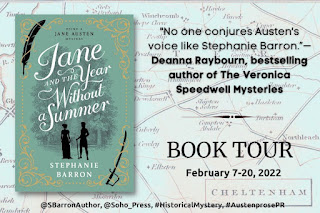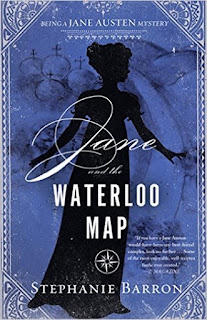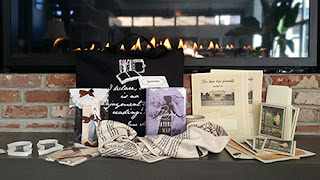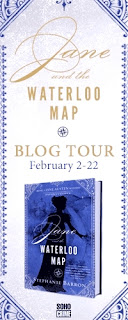This is the latest in the series by Stephanie Barron featuring our beloved authoress, Jane Austen as an amateur sleuth, stumbling across and solving murders. I am a little late to the party on this series, considering this is the first one I’ve read, and it’s number 12 in the series! There are some references to the previous books, but this book is pretty much stand-alone. It is set in the year 1814, so Jane is already a published authoress, with 'Sense & Sensibility', 'Pride & Prejudice' and 'Mansfield Park' all in print, and she is working on 'Emma'.
In this story, Jane, her mother and sister Cassandra are due to stay with Jane’s brother, James Austen, and his family, from just before Christmas right through to Twelfth Night. James took over the living as the Rector of Steventon at his father’s retirement to Bath, so Jane would be staying for Christmas at her childhood home. But instead of opening to a cosy family scene we instead join the ladies en route to Steventon; cold, uncomfortable and tired from their journey and weighed down with the sad certainty that although it is cold and snowing James is too parsimonious to hire a covered carriage for them, and they’ll have to complete the journey in an open carriage with snow driving into their faces and spoiling their bonnets. Unfortunately, they meet a carriage coming the other way and end up colliding, in an accident which leaves the Austens’ conveyance undriveable. The occupant of the other carriage gets out to offer assistance, and though he is obviously in a hurry, being a gentleman he can’t just abandon the ladies, so he offers them the use of his carriage while he takes one of the horses and rides to his destination – The Vyne, whose occupants, the Chutes, have long been known to Jane.
When the ladies arrive at the Steventon Rectory we are treated to a wonderful scene with James’ wife, the deeply tiresome and self-absorbed Mary. I don’t know how closely Mary in this story reflects the real Mary Austen, but if this is a faithful representation then she must have been a strong contender for the model for Mary Musgrove from Persuasion (Anne’s egocentric hypochondriac sister):
“But you did not consider of me, I suppose, as you dawdled along the lanes. I am the very last creature alive, however, to complain of ill-usage at the hands of those I love.”
As you can imagine, the soaked and freezing Jane is highly sympathetic to ‘poor’ Mary:
‘But it was ever thus, in James’s household: the invited guests must immediately minister to the desperate heroine who commanded the scene, and no concerns but hers were broached. I might happily have strangled Mary many years since, so poor a patience do I possess for nerves; and therefore cannot trust myself to cross her doorstep unattended.’
Just when the Austen ladies are beginning to feel that they cannot face spending a full fortnight with the James Austens and need to make their excuses to leave some days early they are saved by a note from Eliza Chute from The Vyne, inviting them all to come and stay for a few days. The invitation is accepted, and the entire party of Austens travel to The Vyne the next day. There are others at the house party; aside from the hosts, the Chutes, and their household, there are Lady Gambier and her niece and nephew, and the gentleman who lent the Austen ladies his carriage, a Mr Raphael West. Mr West is at The Vyne to take some sketches of William Chute for a portrait. An unexpected visitor also arrives, Lieutenant Gage, who has come to confer with Chute in his government capacity.
The next day the Lieutenant leaves for London, but a short while later his horse returns, riderless. A search party sets out and finds the Lieutenant’s body, with a broken neck, presumably thrown from his horse. But Jane’s history of mystery leads her to try and verify this idea – she walks out to the scene where the body was discovered, and finds Mr West there, drawing a scene he is deducing from handprints and other marks in the snow:
‘Our eyes met soberly. “You are sketching a case for murder,” I said. “I thought it my duty,” he replied. “The evidence, you see, is melting.”
And so begins a mystery that will take the twelve days of Christmas to solve. There were some lovely touches in this book. It’s written from Jane Austen’s point of view and I felt the author did a good job of capturing her voice, and dry humour. I also really liked to see the family relationships between the Austens, such as the sweet touch of Jane and her sister delivering a new doll’s outfit to their niece on each of the twelve days, and the little humdrum details added like the former dresses used for the fabric of each doll outfit. The tone was also good, although there was the odd word here or there which I think were American English so seemed a little odd coming from Jane’s pen, but from the point of view of seeing Jane Austen as a character and following her around for twelve days I really enjoyed the book.
For me, the mystery side of the book was less successful, it was pretty slow to get going, and there were leaps and jumps in Jane’s deduction that I couldn’t always see the rationale for, unless it’s just that she understands the human mind better than the average person:
‘The novelist’s perception of motive and character is equally suited to the penetration of human deceit.’
I felt the pace of the novel was a little imbalanced too, as the beginning was slow, but then the ending seemed rushed in comparison. The ending was a little disappointing too, though I suppose it was realistic, but I felt it could have been more satisfying.
However, on the whole I really enjoyed this book. The humorous vein provided by Jane’s thoughts and comments was delightful, and I liked spending time with Jane and her family. There were lots of details weaved into the text in relation to everyday things such as the food served which helped bring the story to life. One of my favourite things about reading historical fiction is that it’s an engaging way to learn some history, and there were some interesting snippets in relation to life in the navy, and also references to things happening in the wider world, such as the situation with Bonaparte. I would certainly read other books in this series!
* My thanks to the publisher and Netgalley for a copy of this book for my honest review.








